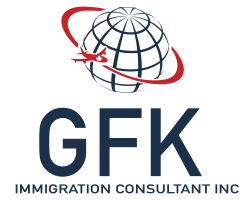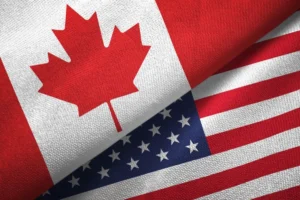 Translate
TranslateIn an unprecedented trend, over 5,000 undocumented Indian immigrants entered the U.S. from Canada in June 2024 alone.
This surge marked the first time more Indian migrants crossed the U.S.-Canada border than the U.S.-Mexico border.
The U.S. has raised concerns with Canada over its lenient visa policies, which have attracted a growing number of international students, contributing to the spike in undocumented crossings.
The U.K. is also impacted, with an increase in Indian nationals seeking asylum during transit to Canada. As these challenges mount, all three nations are reassessing their immigration policies.
Table of Contents
A New Frontline in Immigration Challenges
Stretching nearly 9,000 kilometres, the U.S.-Canada border is the world’s longest undefended boundary and has long symbolized peaceful coexistence between the two nations.
However, it has now become the frontline of a new immigration challenge.
The vast expanse, which is more than twice as long as the U.S.-Mexico border, is witnessing an unprecedented influx of undocumented immigrants, particularly from India.
In June 2024, the situation reached a tipping point. A staggering 5,152 undocumented Indian immigrants crossed from Canada into the U.S. on foot, shattering previous records.
This fivefold increase from the previous year highlights a growing trend that is causing concern on both sides of the border.
Canada’s Visa Policies Under Scrutiny
The surge is closely linked to Canada’s immigration and visa policies.
In an effort to boost its economy and address labour shortages, the Canadian government relaxed its visa regulations around 2017 to attract more international students and immigrants.
The impact was immediate and dramatic. Between 2018 and 2022, the number of international students in Canada skyrocketed by 61%, rising from 566,000 to 800,000.
Canada has become an attractive destination for immigrants due to its favourable policies, quality education system, and multicultural environment.
However, this influx has not gone unnoticed by neighbouring countries.
The United States has expressed concerns that Canada’s relaxed visa policies may inadvertently facilitate the movement of undocumented immigrants into the U.S.
U.S. and U.K. Express Growing Concerns
In response to the escalating numbers, Washington has alerted Ottawa, urging Canada to tighten its visa screening processes.
U.S. officials are particularly concerned that individuals may be exploiting Canada’s immigration system as a gateway to enter the United States unlawfully.
Similarly, the United Kingdom has taken notice of the trend. The U.K. has suggested that all Canada-bound Indian nationals should be required to obtain transit visas for stopovers in the country.
This recommendation comes after a significant spike in asylum claims by Indian nationals in the U.K. during transit to Canada.
In 2022, there was a 136% increase in the number of Indian nationals seeking asylum at U.K. ports compared to the previous year.
By 2023, the number had risen even further, with 1,319 Indian nationals seeking asylum, many of whom were Canada-bound transit passengers. The U.K. government views this as a pressing issue that needs immediate attention to prevent the misuse of transit routes for asylum purposes.
Key Takeaways:
- Over 5,000 undocumented Indian immigrants crossed from Canada to the U.S. in June 2024.
- For the first time, more Indian migrants entered the U.S. via Canada than Mexico.
- Canada’s visa policies, attracting a surge of international students, are facing scrutiny from the U.S. and U.K.
- The situation is causing all three nations to reconsider their immigration strategies.
The Human Aspect of Migration
Behind the statistics are the personal stories of thousands seeking better opportunities.
Many of these immigrants are students or workers who initially entered Canada legally but later chose to cross into the U.S. due to various factors, including employment opportunities, family connections, or perceived advantages in the U.S. immigration system.
The journey across the northern border is fraught with risks. Immigrants often traverse remote and harsh terrains, facing natural obstacles and the possibility of apprehension by border authorities.
The increasing number of crossings raises humanitarian concerns about the safety and well-being of these individuals.
Implications for Immigration Policies
The surge in undocumented crossings is forcing the U.S., Canada, and the U.K. to re-evaluate their immigration and border control policies.
For the United States, the northern border has historically been less of a focus compared to the southern border with Mexico.
However, the recent trends suggest a need for increased resources and attention.
Canada faces the challenge of balancing its economic goals with the responsibility of ensuring that its immigration policies are not exploited.
Tightening visa screenings and collaborating with international partners may become necessary steps to address the issue.
The U.K.’s concerns highlight the international ramifications of one country’s immigration policies on global migration patterns.
By considering the implementation of transit visas for Canada-bound passengers, the U.K. aims to prevent the unintended consequence of asylum claims during layovers.
A Crossroads for International Cooperation
As the situation evolves, it underscores the complexity of global migration in an interconnected world.
The three nations find themselves at a crossroads, where unilateral actions may not be sufficient.
Collaborative efforts and international cooperation could be key in developing effective strategies to manage immigration flows while respecting human rights and humanitarian considerations.
The surge also comes at a politically sensitive time, particularly for the United States, which is approaching a crucial election year.
Immigration remains a hot-button issue, and developments at the northern border add another layer to the national discourse.
Conclusion
The unexpected increase in undocumented Indian immigrants crossing the U.S.-Canada border is a multifaceted issue that highlights the interconnectedness of international policies and migration trends.
It calls for a nuanced approach that considers economic needs, security concerns, and humanitarian responsibilities.
Both the U.S. and Canada will need to work closely to address the root causes of the surge and implement measures that ensure the integrity of their borders without compromising the values of openness and cooperation that have long defined their relationship.
GFK Immigration
Gboyega Esan RCIC R708591
Phone: +1 (647) 225-0092
#immigration #immigrationnews #news #blognews #canada #Pr #FamilySponsorship #GFKImmigration #ReuniteInCanada #ImmigrationExperts #FamilyFirst #CanadianDream #CanadaPR #CanadaBound #RelocateWithEase #canada #canadaimmigration #immigration #studyincanada #studyabroad #visa #ielts #canadapr #studentvisa #studyvisa

